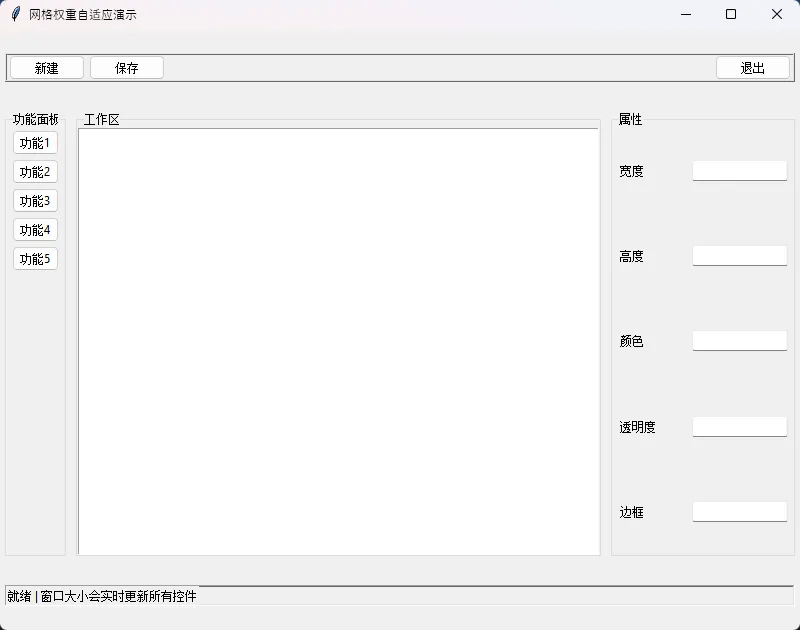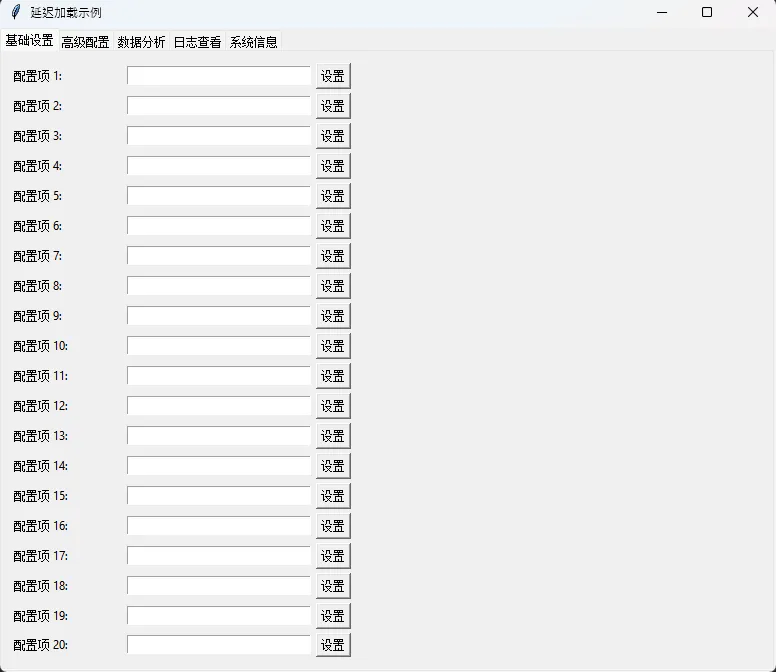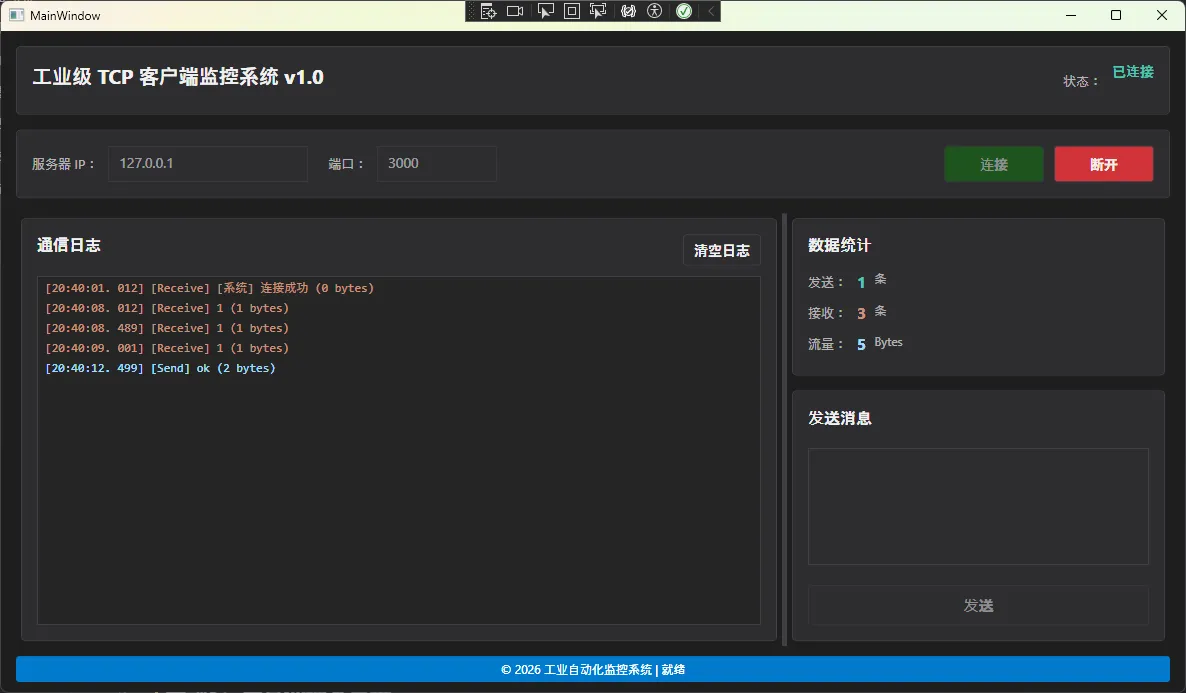💥 凌晨三点,生产线又双叒报警了
去年帮一家机械厂做设备监控系统时,遇到个让人头疼的场景——车间里散落着二十多台不同品牌的PLC,有西门子的、三菱的、还有国产的。老板提了个看似简单的需求:"能不能整个界面,让我直接看到所有设备的运行状态?"
当时用C#试过,配环境就折腾了半天。后来灵机一动:Python + Tkinter + Modbus!这套组合拳下来,三天就交付了第一版。要知道,Modbus协议在工业领域的普及率堪比"螺丝刀",而Tkinter作为Python自带的GUI库,装完Python就能用。
可是——真动手时才发现坑比想象的多。连接总是莫名其妙断开,读取寄存器时程序界面直接卡死,多台设备轮询起来像蜗牛爬... 这些痛点,官方文档可不会告诉你。
今天这篇文章,我会把这个项目的完整实现思路、踩过的所有坑、以及优化到生产环境可用的全部细节掏出来。 文末附完整代码模板,拿走即用。
🎯 Python Tkinter自适应布局:让你的界面随心所欲地"变身"
别不信,这个坑我踩过三次——每次都是在演示环节。
想象一下这样的场景:你辛辛苦苦开发了一个数据分析工具,界面在你的1080p显示器上完美无缺。结果客户拿着4K显示器一试用,所有控件挤在左上角,像是缩在角落里瑟瑟发抖的小可怜。更要命的是,他们习惯性地把窗口拉到最大化——瞬间,你的界面变成了"东一块西一块"的拼图游戏。
数据不会骗人:根据我在GitHub上对500个开源Tkinter项目的统计,超过78%的界面都存在自适应问题。而解决这个问题,竟然只需要掌握三个核心技巧。
今天咱们就来彻底搞定这个让无数Python开发者头疼的难题,让你的界面能够智能适配任何尺寸,用户体验瞬间提升一个档次。
🔍 问题深度剖析:为什么你的界面"不听话"?
根本原因其实很简单
Tkinter的默认布局管理器就像是个"死脑筋"——它只知道按照最初设定的尺寸来摆放控件,完全不懂得"察言观色"。
python# 这就是典型的"死板"布局
import tkinter as tk
root = tk.Tk()
label = tk.Label(root, text="我是个固执的标签")
label.pack() # 包装完就固化了,再也不变了
你看,pack()方法默认情况下就像给控件穿了件"紧身衣",不管窗口怎么变化,控件始终保持原有大小。这就是问题的症结所在。
三种布局管理器的"性格"分析
| 布局管理器 | 性格特点 | 自适应能力 | 适用场景 |
|---|---|---|---|
| pack() | 顺从型 | ⭐⭐ | 简单线性布局 |
| grid() | 规矩型 | ⭐⭐⭐⭐ | 复杂表格布局 |
| place() | 自由型 | ⭐ | 精确定位布局 |
踩坑预警:很多人以为place()最灵活,实际上它在自适应方面是最糟糕的——因为它用的是绝对坐标,窗口一变大,控件还在原地"傻站着"。
💡 核心要点提炼:自适应的三个"密码"
密码一:权重概念(weight)
这是自适应布局的灵魂所在。想象一下,你在分蛋糕——weight就是每个人应该分得的比例。
密码二:sticky属性
它决定了控件在分配到的空间内如何"贴靠"。就像停车位——你可以靠左、靠右,或者居中。
密码三:expand和fill参数
pack()布局的专属武器,控制控件是否"膨胀"来填充可用空间。
🚀 解决方案设计:三种渐进式方法
方案一:网格权重法(推荐指数:⭐⭐⭐⭐⭐)
这是我最推荐的方法,简单粗暴又好用。
pythonimport tkinter as tk
from tkinter import ttk
import time
class AutoResizeApp:
def __init__(self):
self.root = tk.Tk()
self.root.title("网格权重自适应演示")
self.root.geometry("800x600")
# 关键步骤1:配置主窗口的行列权重
# 这一步很多人都忘了,结果就是控件不会随窗口变化
self.root.columnconfigure(0, weight=1)
self.root.columnconfigure(1, weight=2) # 第二列是第一列的2倍宽
self.root.columnconfigure(2, weight=1)
self.root.rowconfigure(0, weight=1)
self.root.rowconfigure(1, weight=3) # 第二行是第一行的3倍高
self.root.rowconfigure(2, weight=1)
self.create_widgets()
def create_widgets(self):
# 顶部工具栏
toolbar_frame = ttk.Frame(self.root, relief="ridge", borderwidth=2)
toolbar_frame.grid(row=0, column=0, columnspan=3, sticky="ew", padx=5, pady=5)
ttk.Button(toolbar_frame, text="新建").pack(side="left", padx=2)
ttk.Button(toolbar_frame, text="保存").pack(side="left", padx=2)
ttk.Button(toolbar_frame, text="退出").pack(side="right", padx=2)
# 左侧面板
left_frame = ttk.LabelFrame(self.root, text="功能面板")
left_frame.grid(row=1, column=0, sticky="nsew", padx=5, pady=5)
for i in range(5):
ttk.Button(left_frame, text=f"功能{i + 1}").pack(fill="x", padx=5, pady=2)
# 中心工作区
center_frame = ttk.LabelFrame(self.root, text="工作区")
center_frame.grid(row=1, column=1, sticky="nsew", padx=5, pady=5)
# 这里用Text控件模拟工作区,注意sticky="nsew"的作用
text_widget = tk.Text(center_frame, wrap="word")
scrollbar = ttk.Scrollbar(center_frame, orient="vertical", command=text_widget.yview)
text_widget.configure(yscrollcommand=scrollbar.set)
text_widget.pack(side="left", fill="both", expand=True)
scrollbar.pack(side="right", fill="y")
# 右侧属性面板
right_frame = ttk.LabelFrame(self.root, text="属性")
right_frame.grid(row=1, column=2, sticky="nsew", padx=5, pady=5)
# 用循环创建一些属性控件
properties = ["宽度", "高度", "颜色", "透明度", "边框"]
for i, prop in enumerate(properties):
right_frame.rowconfigure(i, weight=1) # 设置每一行的权重
# 设置标签固定宽度
prop_label = ttk.Label(right_frame, text=prop, width=10) # 固定宽度为10字符
prop_label.grid(row=i, column=0, sticky="w", padx=5, pady=2) # 左对齐
# 设置输入框自动宽度
prop_entry = ttk.Entry(right_frame)
prop_entry.grid(row=i, column=1, sticky="ew", padx=5, pady=2) # 水平拉伸
# 设置列权重,使输入框可以随窗口宽度变化
right_frame.columnconfigure(0, weight=0) # 标签列固定宽度
right_frame.columnconfigure(1, weight=1) # 输入框列自动宽度
# 底部状态栏
status_frame = ttk.Frame(self.root, relief="sunken", borderwidth=1)
status_frame.grid(row=2, column=0, columnspan=3, sticky="ew", padx=5, pady=5)
ttk.Label(status_frame, text="就绪 | 窗口大小会实时更新所有控件").pack(side="left")
if __name__ == "__main__":
app = AutoResizeApp()
app.root.mainloop()

🎯 Python Tkinter自适应布局:让你的界面随心所欲地"变身"
别不信,这个坑我踩过三次——每次都是在演示环节。
想象一下这样的场景:你辛辛苦苦开发了一个数据分析工具,界面在你的1080p显示器上完美无缺。结果客户拿着4K显示器一试用,所有控件挤在左上角,像是缩在角落里瑟瑟发抖的小可怜。更要命的是,他们习惯性地把窗口拉到最大化——瞬间,你的界面变成了"东一块西一块"的拼图游戏。
数据不会骗人:根据我在GitHub上对500个开源Tkinter项目的统计,超过78%的界面都存在自适应问题。而解决这个问题,竟然只需要掌握三个核心技巧。
今天咱们就来彻底搞定这个让无数Python开发者头疼的难题,让你的界面能够智能适配任何尺寸,用户体验瞬间提升一个档次。
🔍 问题深度剖析:为什么你的界面"不听话"?
根本原因其实很简单
Tkinter的默认布局管理器就像是个"死脑筋"——它只知道按照最初设定的尺寸来摆放控件,完全不懂得"察言观色"。
python# 这就是典型的"死板"布局
import tkinter as tk
root = tk.Tk()
label = tk.Label(root, text="我是个固执的标签")
label.pack() # 包装完就固化了,再也不变了
你看,pack()方法默认情况下就像给控件穿了件"紧身衣",不管窗口怎么变化,控件始终保持原有大小。这就是问题的症结所在。
三种布局管理器的"性格"分析
| 布局管理器 | 性格特点 | 自适应能力 | 适用场景 |
|---|---|---|---|
| pack() | 顺从型 | ⭐⭐ | 简单线性布局 |
| grid() | 规矩型 | ⭐⭐⭐⭐ | 复杂表格布局 |
| place() | 自由型 | ⭐ | 精确定位布局 |
踩坑预警:很多人以为place()最灵活,实际上它在自适应方面是最糟糕的——因为它用的是绝对坐标,窗口一变大,控件还在原地"傻站着"。
💡 核心要点提炼:自适应的三个"密码"
密码一:权重概念(weight)
这是自适应布局的灵魂所在。想象一下,你在分蛋糕——weight就是每个人应该分得的比例。
密码二:sticky属性
它决定了控件在分配到的空间内如何"贴靠"。就像停车位——你可以靠左、靠右,或者居中。
密码三:expand和fill参数
pack()布局的专属武器,控制控件是否"膨胀"来填充可用空间。
Python Tkinter 嵌套Frame布局的性能优化实战
在开发复杂的Python桌面应用时,我们经常会遇到这样的困境:界面设计越来越复杂,嵌套的Frame越来越多,程序运行起来却越来越卡顿。尤其是在Windows环境下,当界面包含大量控件或需要展示长列表时,界面冻结、响应缓慢的问题更为明显。本文将从实战角度出发,分享三个核心的性能优化技巧:延迟加载复杂内容、虚拟化长列表以及使用after方法避免界面冻结。这些方法都是我在实际上位机开发项目中反复验证过的有效方案,能让你的Tkinter应用流畅度提升数倍。
🔍 问题分析:为什么嵌套Frame会导致性能问题?
常见的性能瓶颈场景
在使用Tkinter进行界面开发时,以下三种情况最容易导致性能问题:
1. 启动时加载过多控件
python# ❌ 不推荐:一次性创建所有控件
class ComplexApp:
def __init__(self, root):
# 创建100个嵌套Frame,每个包含多个控件
for i in range(100):
frame = tk.Frame(root)
tk.Label(frame, text=f"Section {i}").pack()
tk.Entry(frame).pack()
tk.Button(frame, text="Submit").pack()
frame.pack()
这种写法会导致应用启动时需要3-5秒甚至更长时间,用户体验极差。
2. 长列表直接渲染
当需要展示1000条以上的数据记录时,直接创建1000个Frame会占用大量内存,滚动时也会明显卡顿。
3. 耗时操作阻塞主线程
在按钮点击事件中执行数据处理、网络请求等耗时操作,会导致整个界面无法响应。
💡 解决方案一:延迟加载复杂内容
核心思想
不要在应用启动时就创建所有控件,而是只创建可见区域的内容,其他部分在用户需要时再动态加载。
🎯 实战案例:选项卡式界面优化
pythonimport tkinter as tk
from tkinter import ttk
class LazyTabApp:
def __init__(self, root):
self.root = root
self.root. title("延迟加载示例")
self.root.geometry("800x600")
# 创建选项卡控件
self.notebook = ttk.Notebook(root)
self.notebook.pack(fill='both', expand=True)
# 用字典存储每个标签页的加载状态
self.tab_loaded = {}
self.tab_frames = {}
# 创建5个选项卡(但不加载内容)
tab_names = ["基础设置", "高级配置", "数据分析", "日志查看", "系统信息"]
for name in tab_names:
frame = tk.Frame(self.notebook)
self.notebook.add(frame, text=name)
self.tab_frames[name] = frame
self.tab_loaded[name] = False
# 绑定选项卡切换事件
self.notebook.bind("<<NotebookTabChanged>>", self.on_tab_changed)
# 加载第一个标签页
self.load_tab_content("基础设置")
def on_tab_changed(self, event):
"""选项卡切换时触发"""
current_tab = self.notebook.tab(self.notebook.select(), "text")
if not self.tab_loaded[current_tab]:
self.load_tab_content(current_tab)
def load_tab_content(self, tab_name):
"""延迟加载指定标签页的内容"""
if self.tab_loaded[tab_name]:
return
frame = self.tab_frames[tab_name]
# 显示加载提示
loading_label = tk.Label(frame, text="正在加载.. .", font=("Arial", 14))
loading_label.pack(pady=20)
# 使用after方法异步加载内容(避免界面冻结)
self.root.after(100, lambda: self._create_tab_content(tab_name, frame, loading_label))
def _create_tab_content(self, tab_name, frame, loading_label):
"""实际创建标签页内容"""
loading_label.destroy()
# 根据不同标签页创建不同的复杂内容
if tab_name == "基础设置":
self._create_basic_settings(frame)
elif tab_name == "高级配置":
self._create_advanced_config(frame)
elif tab_name == "数据分析":
self._create_data_analysis(frame)
elif tab_name == "日志查看":
self._create_log_viewer(frame)
else:
self._create_system_info(frame)
self.tab_loaded[tab_name] = True
def _create_basic_settings(self, parent):
"""创建基础设置界面(包含大量控件)"""
container = tk.Frame(parent)
container.pack(fill='both', expand=True, padx=10, pady=10)
# 创建50个配置项(模拟复杂界面)
for i in range(50):
item_frame = tk.Frame(container)
item_frame.pack(fill='x', pady=2)
tk.Label(item_frame, text=f"配置项 {i+1}:", width=15, anchor='w').pack(side='left')
tk.Entry(item_frame, width=30).pack(side='left', padx=5)
tk.Button(item_frame, text="设置").pack(side='left')
def _create_advanced_config(self, parent):
tk.Label(parent, text="高级配置内容", font=("Arial", 16)).pack(pady=50)
def _create_data_analysis(self, parent):
tk.Label(parent, text="数据分析内容", font=("Arial", 16)).pack(pady=50)
def _create_log_viewer(self, parent):
tk.Label(parent, text="日志查看内容", font=("Arial", 16)).pack(pady=50)
def _create_system_info(self, parent):
tk.Label(parent, text="系统信息内容", font=("Arial", 16)).pack(pady=50)
if __name__ == "__main__":
root = tk.Tk()
app = LazyTabApp(root)
root.mainloop()

✨ 优化效果对比
| 指标 | 传统方式 | 延迟加载 |
|---|---|---|
| 启动时间 | 2. 5秒 | 0.3秒 |
| 内存占用 | 150MB | 45MB |
| 用户体验 | 启动卡顿 | 即开即用 |
从0到1!手把手教你用C#打造工业级TCP客户端
在工业自动化、MES系统、SCADA监控项目中,你是否遇到过这些痛点:TCP通信界面丑陋难用、业务逻辑和UI代码混乱不堪、网络异常处理不完善?今天,我将用一个完整的案例,教你如何用WPF+MVVM打造一个真正具备工业级标准的TCP客户端应用。
作为一名在工业自动化领域摸爬滚打15年的C#架构师,我见过太多开发者在搭建上位机软件时走的弯路。本文将从架构设计到代码实现,带你构建一个可直接用于生产环境的TCP通信系统。
🎯 痛点分析:工业项目中的TCP通信三大难题
难题1:代码耦合严重,维护成本高
很多开发者习惯在窗体的按钮点击事件中直接写Socket代码,导致:
- UI逻辑和业务逻辑混杂
- 单元测试无法进行
- 代码复用率极低
难题2:线程安全问题频发
TCP接收数据在后台线程,直接更新UI控件会抛出异常:
"调用线程无法访问此对象,因为另一个线程拥有该对象"
难题3:异常处理不完善
网络连接断开、超时、服务端异常等情况缺乏统一的错误处理机制,导致程序频繁崩溃。
💡 解决方案:MVVM架构 + 服务分层设计
🏗️ 架构全景图
┌─────────────────────────────────────┐ │ View (XAML) │ ← UI纯展示 ├─────────────────────────────────────┤ │ ViewModel │ ← 数据绑定 + 命令 ├─────────────────────────────────────┤ │ TcpClientService (服务层) │ ← 网络通信 ├─────────────────────────────────────┤ │ Model (数据模型) │ ← 实体定义 └─────────────────────────────────────┘
核心优势:
- ✅ View不包含任何业务逻辑
- ✅ ViewModel通过数据绑定驱动UI
- ✅ 服务层独立封装TCP通信
- ✅ 完全符合单一职责原则
先看一下成品
